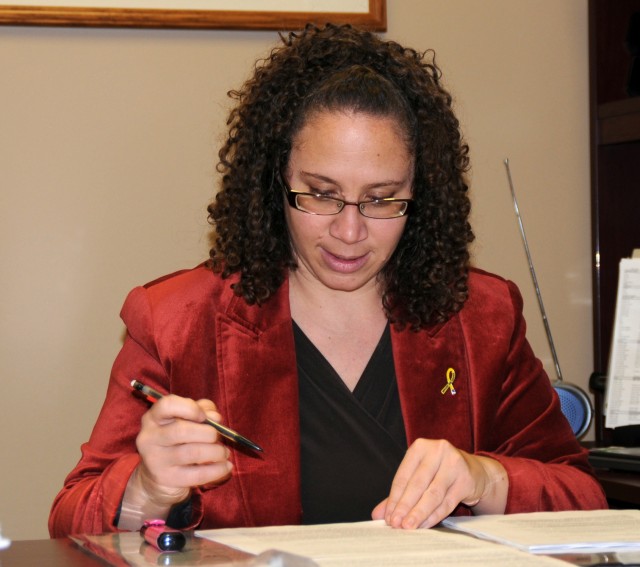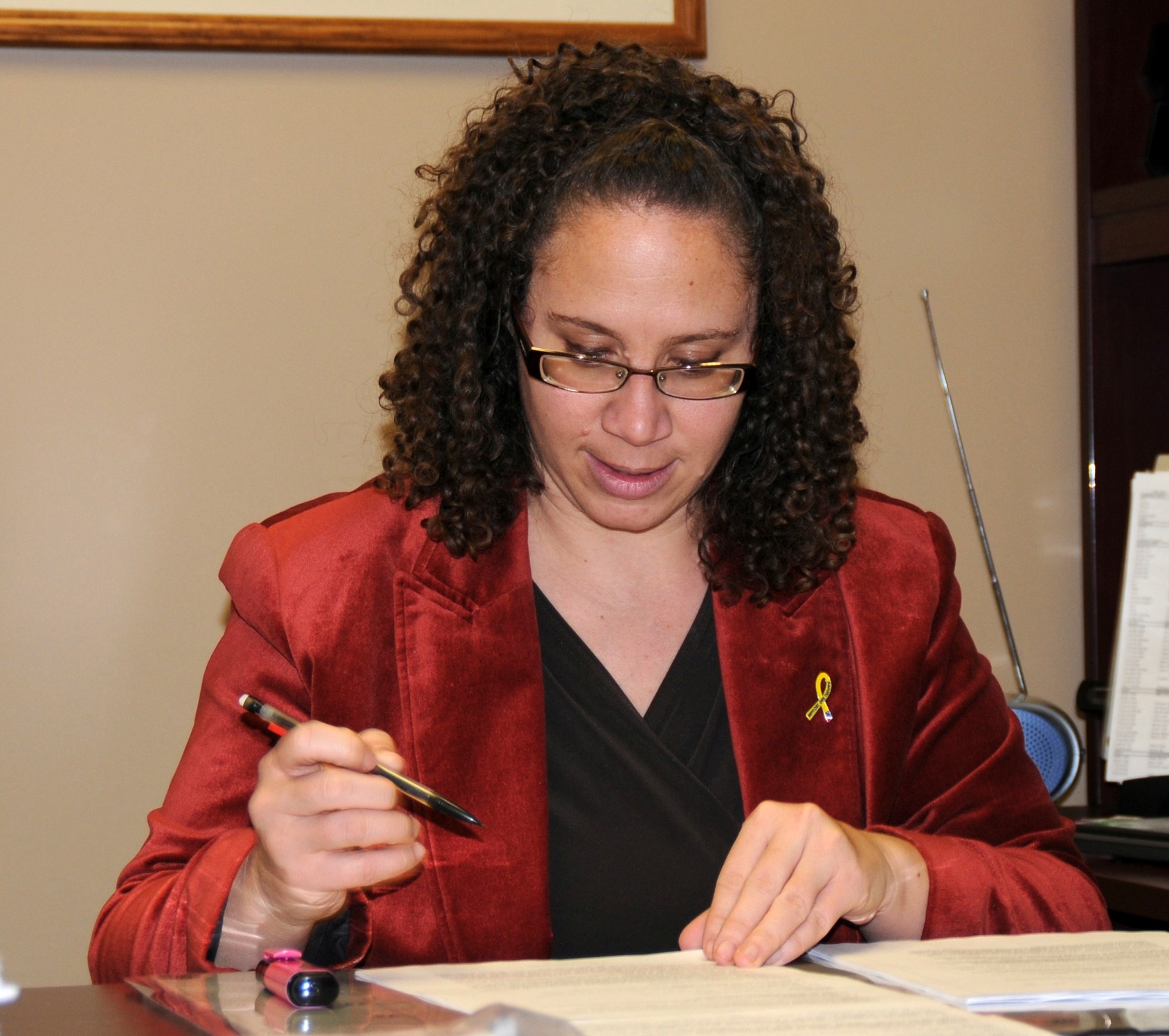Few people on Fort Drum know anything about the job title Carrie Tate-Meyer holds today. Up until two months ago, neither had she.
That's because a small office, buried behind 10th Mountain Division's chief of staff at Hays Hall, recently became the command center for the Family Readiness Program manager, a newly created G-1 staff position filled by Tate-Meyer on Dec. 7.
Backed by the commanding general, the role of the FRP manager is to standardize family readiness by centralizing all avenues of communication among units, commanders, family readiness support assistants and family readiness group leaders.
As a shared channel, Tate-Meyer said she must make sure well-being programs vital to the community are passed down to Soldiers and their Families while also ensuring that the needs of each unit, at all stages of the deployment cycle, are expressed to members of the command group.
"It's a very new position," Tate-Meyer said. "Most people are accustomed to what was called the division FRSA. There is no longer a position titled division FRSA, (although) some of my responsibilities mirror what the division FRSA did."
Tate-Meyer, who served as 2nd Brigade Combat Team's FRSA from 2005 to 2007, said she believes family readiness on Fort Drum has dramatically improved.
"Since two years ago, the command emphasis has grown strongly," she said. "The reason for that is because here at Fort Drum, the commanding general has identified family readiness as one if his top five lines of effort for this division to focus on.
"It's my responsibility to ensure that all the commanders are meeting that need," she said, "that they're hitting the main points of training and preparing Families for deployments, and to help set them up for success before, during and after (Soldiers') deployments."
The FRP manager reports directly to the commanding general and chief of staff personnel. After informing the command, Tate-Meyer receives feedback from them and determines the efficiency of family readiness programs by talking to unit leaders, FRSAs, FRG leaders and directors from programs such as Army Community Service and other elements of Family and Morale, Welfare and Recreation.
Once 1st Brigade Combat Team readied to deploy to Afghanistan and 3rd Brigade Combat Team redeployed, Tate-Meyer said she updated G-1 of objectives critical to family readiness, including pre-deployment briefs, reintegration training, chaplain services, reunion briefs, marriage retreats and more.
"Great things are going to happen with the addition (of Tate-Meyer) to the team," said Mark Martin, director of Mission Support Element G-1 and Tate-Meyer's direct supervisor.
"Carrie is very knowledgeable of family readiness programs and wants to ensure all Families are aware of the opportunities they have," he said.
Tate-Meyer was born and raised in southern California, where she met her future husband and married in 1999. She said her passion for family readiness programs is rooted in her husband's decision to join the Army two years later.
"I had different plans," said Tate-Meyer, who graduated law school in 2002 and moved with her husband to Fort Drum the same year.
"When I got here, it was a bit of a shakeup," she said. "I realized that for me to be successful in this life - because it is a different life - I had to be educated, to know what's out there, to help me and help my Family."
Tate-Meyer quickly became an Army Family Team Building instructor at Fort Drum. She also had her first son, Justus, while her husband was in Iraq six years ago. She said his name comes not just from one of her ideological pursuits, but because it was "just us."
Before returning to Fort Drum last month, Tate-Meyer was an AFTB program manager and an ACS master trainer at Fort Benning, Ga., where she also earned a master in public administration degree and had her second son, Nikolas.
With the challenges of her new job, which came with no previous mold, Tate-Meyer hopes to establish herself as a proactive and helpful presence within 10th Mountain Division (LI).
"There's room for me to grow and the opportunity to figure it out," she said. "But also, because it's new, I'm quite unsure exactly where the position will go."
"I guarantee this job will evolve while I'm here," she added.
Along with the spouses of top commanders and others, Tate-Meyer said she is coordinating a symposium for the division that will provide education, forums and learning tools to help improve the FRG leadership.
Tate-Meyer will most likely say goodbye to her husband in the coming weeks. Staff Sgt. Ian Meyer, who trains junior infantry officers at Fort Benning, is coming to Fort Drum, where he will join 2nd Battalion, 22nd Infantry Regiment.
When he deploys, it will be his second tour to Afghanistan.
But Tate-Meyer is accustomed to such difficult separations, and in a way, the trials and struggles of this military spouse have turned out to be inadvertently fortunate.
"It's been a different life," Tate-Meyer said. "Most people ask why I'm not practicing law. My philosophy has always been, even when I entered law school, to help people.
"My help is different now. It's with Soldiers and their Families," she said. "But it's what I like. It affects me more. I'm married to a Soldier; I go through the same things (as other military spouses).
"I'm doing exactly what I wanted when I entered into law school, and that is to help people."


Social Sharing